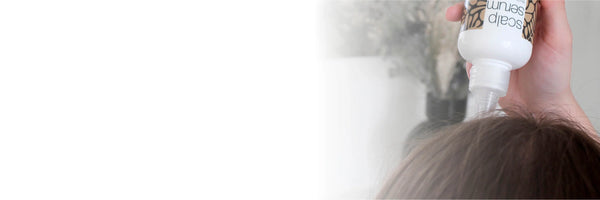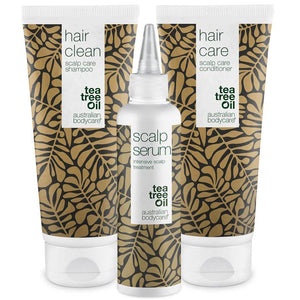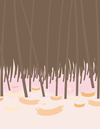1. Scalp Massage
Possibly the most effective and easiest treatment for dry scalp is a scalp massage. You can give yourself a gentle massage by simply rubbing your fingertips in a gentle, circular motion over your scalp while shampooing or applying oil.
Scalp massages can stimulate the production of natural oils and increase blood flow towards the hair follicles, meaning they receive more nutrients and hair growth is promoted.
Using lukewarm tea tree oils during massage can not only be therapeutic, but can also work as natural anti-inflammatory, anti-fungal and anti-bacterial agents which can resolve itchiness and soothe the scalp.
Running a brush through your hair is recommended as the unique structure of the boar bristle can carry natural oils produced by the scalp all the way down to the end of the hair shaft. This results in shiny, well-conditioned hair and removal of any oil or hair product build-up on the scalp.
A gentle pre-wash massage with a boar brush can open up pores on the scalp and remove dead skin cells so that the scalp can be properly cleansed and moisturised.
Running a brush through your hair is recommended as the bristles can distribute the natural oils produced by the scalp evenly through the hair and scalp. Resulting in shiny, well-conditioned hair and prevention of any oil or hair product build-up on the scalp.
A gentle pre-wash massage with a strong bristled brush can open up pores on the scalp and allow dead skin cells to be removed so that the scalp can be properly cleansed and moisturised.
Read More About: Causes Of An Itchy Scalp: 6 Common Causes
2. Conditioning Treatments
When the scalp is not producing enough natural oil, it can cause hair to appear dull and the scalp to feel itchy and become flaky. By nourishing the scalp with a scalp treatment, you can instantly soothe the scalp and treat the main causes of dryness and itchiness.
A scalp treatment can nourish the scalp preventing problems such as itching and irritation.
It is important to choose the correct type of hair and scalp treatment that matches your hair type, it is recommended that you choose one that has a high constituent of natural ingredients.
A good scalp treatment should be left in for at least 20 minutes to fully penetrate the scalp. Once the treatment is complete; rinse hair with cool water to help close the hair follicles and the cuticle of the hair to seal in maximum moisture. For best results a scalp treatment should be applied at least once a week.
3. Use Tea Tree Oil
The beneficial anti-bacterial, anti-fungal and anti-septic properties of Tea tree oil make it a highly popular natural alternative to harsh chemicals.
The oil is found in the leaves of the Australian Tea Tree (Melaleuca alternifolia) and can be found in various products such as herbal gels, creams, shampoos and conditioners.
This oil can be applied to the hair and scalp in various ways. However, it should not be applied directly to the scalp, or directly onto the skin as it can cause skin irritation.
Dilute the oil with a carrier oil such as castor oil, coconut oil or other hair friendly oils Apply to the hair and leave in overnight. This will allow the anti-bacterial, anti-fungal and cleansing properties to get to work whilst moisturising the scalp.
Adding a few drops of pure Tea Tree Oil to your regular shampoo is another great way to nourish and cleanse your scalp and hair.
Did you know:
The Australian Bodycare hair range with Tea Tree Oil is designed to remedy scalp problems.
Highly effective against dandruff and an irritated and dry scalp. The products have been clinically proven to treat the scalp and leave your hair beautifully conditioned – See the products here.
Read More About: Benefits Of Using Tea Tree Oil For Your Hair
Tip of the day: Watch the video: How to use products with Tea Tree Oil
4. Change Your Shampoo and Hair Products
A dry and irritated scalp can be caused by shampooing too regularly or by using products which are too harsh for your scalp and hair.
The best advice is to avoid shampooing every day or choose a gentle formula shampoo specially formulated for dry hair.
Frequent washing with hot water and using hair products which contain alcohol can also contribute to drying out the scalp and making the condition worse. Choosing a more suitable shampoo may be trial and error, however a professional and high-quality shampoo can make a huge difference in cleansing and hydrating the scalp.
To avoid hair drying out and allow the scalp a chance to recover and naturally nourish itself it is best to minimise or stop using heated hair products and hair dryers
If you can’t pack away your styling products for good, then you can always change to a more suitable, lightweight product. Try and find one that coats the hair with a protective layer to give softer, shinier and smoother hair.
5. Diet Changes
A poor diet, deficient in key nutrients that support skin health, can a major contributor to the development of a dry and irritated scalp. Following a healthy well-balanced diet, will help relieve the condition.
Key nutrients include;
- Research suggests that hair, skin, teeth and nails do not grow properly without zinc. The mineral is important for healthy tissue growth and repair throughout the entire body.
- Omega-3 fatty acids – dry scalp can be an indicator of a deficiency in these fatty acids. Lack of Omega-3 fatty acids can lead to dry skin and poor blood circulation, both contribute to a dry scalp.
- Vitamin A – liver, eggs, dairy products and many fruits and vegetables are excellent sources of vitamin A which is known to support the maintenance and function of skin cells. By ensuring that enough vitamin A is included in your diet, you can help avoid a dry scalp.
It is also known that a diet high in sugar can worsen dandruff and dry scalp conditions. Dandruff is often associated with dry scalp and attributed to the candida yeast; an over-consumption of sugar can promote the growth of this yeast and make the problem worse.
6. Stay Hydrated
We all know how important staying hydrated is for a healthy glowing complexion, but dehydration can also be a cause of a dry scalp.
When your body is dehydrated, you may have noticed how dry your skin becomes, as well as other symptoms such as feeling tired or unwell but you probably have not noticed the resulting dryness on your scalp.
Your scalp is more prone to becoming dry as it is more exposed, sometimes directly, to the sun and is not usually moisturised or given the hydration it requires. All these factors contribute to a dry, itchy and, in more serious cases, a flaky scalp.
The general advice is to drink six to eight glasses of water per day for optimal hydration. This figure does vary from person to person and according to climate and activity levels.
7. Use Coconut and Tea Tree Oil:
Coconut Oil is known for its highly moisturising properties for hair. The application of a combination of Tea Tree Oil and Coconut Oil can encourage blood circulation to the hair follicles and to the scalp helping the supply of essential nutrients.
Between hair washes, the oil can act as a protective barrier and seal moisture into the hair so that it remains soft and shiny.
Some people like to use warm coconut oil as a scalp treatment by applying it directly to their hair, using a comb to work the oil into the hair and then leaving the oil to soak for a few hours before shampooing.
Not only does it smell great, but as it is completely natural, a much better alternative to most products available that offer similar results.
If you do not like the scent of coconut oil, you can easily mix in one or two drops of your favourite smelling essential oil.
Symptoms Of A Dry Scalp
Often people with a dry and flaking scalp, initially suspect dandruff. However, it is just as likely that these two symptoms are a result of really dry scalp.
Dry scalp usually develops when the scalp has too little moisture, this causes irritation to the skin causing it to flake. Some people may find that other parts, such as their arms and legs also become dry.
There are many factors that can contribute to the development of this condition such as temperature, age and reactions to products these are all discussed in detail below.
Read more about: How to get rid of dandruff
One way to differentiate between dry scalp and dandruff is by assessing the appearance of the flakes.
Typically, dandruff flakes are larger in size, yellow or white in colour and may even look oily. Sometimes dandruff flakes also are harder to come off the skin.
Smaller dry flakes indicate dry scalp and there may also be dry skin on other parts of the body. Both conditions cause an itchy scalp, however, dandruff patients often present with red, oily and scaly-looking skin.
Causes Of A Dry Scalp
Why is my scalp so dry? The causes of dry scalp can be divided into two, internal and external;
Internal causes;
- Skin conditions, such as dermatitis or psoriasis
- Age, typically our skin tends to become dryer as we get older
- Physical and emotional stresses or a lack of proper rest
- A hereditary predisposition
- Hormonal changes and imbalances
- Excessive consumption of sugars, fats and starch or an improper diet
Within the scalp there are many sebaceous glands, just like in the skin on the rest of the body. They generate oily sebum, which contains fat and dead skin cells. The glands work to oil and protect our skin so that it is waterproof, does not dry out and remains supple. The production of sebum also ensures that the hair does not dry out and become dry and brittle.
If the natural production of sebum is too low, you will find that your scalp becomes dry. Older people generally produce less sebum, so they are particularly vulnerable to this.
However, there may also be other causes of dry scalp. Some medical conditions such as having a too low or too high metabolism, diabetes, liver or kidney disease, asthma, eczema and allergic reactions to certain types of medication can all cause dry skin. Also, if you drink too little water, have a poor diet or vitamin deficiency.
External causes;
A dry scalp is often caused by external factors. Hair washing a little too often, using harsh shampoo and some types of hair styling products and overuse of the hair dryer can all contribute to a dry scalp.
Among the external causes are:
- Changes in temperature or season, cold weather and winters are often associated with dry scalp.
- Excessive use of hair products such as soaps, shampoos and hair treatments which can irritate the skin and result in the development of contact dermatitis.
- Environmental pollution
- Lifestyle factors such as smoking or a poor diet which can cause dehydration
- Medications which can cause dehydration
Dry scalp is primarily caused by the skin having too little moisture, which is why patients will often find dry skin on other areas of their bodies too. The best and most effective way to cure dry scalp is to increase hydration and moisturise the scalp regularly as described above.
If the root cause of the itchiness and flakiness turns out to be dandruff, the condition can be treated with simple over-the-counter shampoos. If there is no improvement within a month and the scalp appears to be getting irritated or inflamed it is best to make an appointment with your doctor.
A doctor will be able to immediately diagnose your condition and rule out any other skin disorders by a simple visual assessment of your scalp.
Extremely Dry Scalp
An extremely dry scalp can lead to scabs on the scalp, the skin may feel tight and you may experience severe itching. These are generally the worst, most developed symptoms of a dry scalp. It is therefore important that you react quickly and find a good treatment to soothe and remedy the symptoms.
This often becomes worse in the winter months. Cold temperatures, wind and low humidity dry the skin more than in the summer.
Therefore, we need to take extra care of our skin and scalp in the winter. It is important to choose products that work well to protect and moisturise the skin.
Dry Scalp – Frequently Asked Questions
Why is my scalp so itchy?
An itchy scalp can be frustrating as it can cause frequent scratching and discomfort. Often the root cause is dandruff or dry skin, however it could be down to simply having a sensitive scalp.
Why does my scalp hurt?
Sometimes it feels as if the scalp is prickling, burning or tingling and those who have naturally greasy or dry hair are more likely to feel these sensations. The causes include dandruff, infections or even infestations by head lice.
What causes itchy scalp?
An itchy scalp can be caused by dandruff, psoriasis, fungal infections, head lice or sometimes an allergic reaction. Usually an itchy scalp is not too much to worry about, however if you find over-the-counter shampoos aren’t improving your condition, the itchiness is affecting your concentration or the skin is sore to touch, it is best to see a doctor.
How to get rid of flaky scalp?
You can try washing your hair regularly, switching shampoos to a more gentle or moisture retaining type, using moisturising treatments or a moisturising conditioner. Try to avoid scratching if the skin is flaking off as this can lead to infections.
What is seborrheic dermatitis?
This condition is considered a chronic form of eczema which appears on the skin in areas where there are multiple sebaceous glands. Patients will present with dry flakes of skin on the scalp and other oily areas of the body.
Skin cancer on the scalp?
Skin cancer can occur on the scalp as the skin in this area has pigment-producing cells. However, skin cancer appearance can vary depending on the type of cancer – basal cell skin cancer, squamous skin cell cancer or melanoma. These can be harder to spot on the scalp because it may be covered in hair and the difficulty in seeing the back and sides of the head. If you notice something different about an area of the skin on your scalp it is best to see a doctor to get it checked out.
Why do I get spots on my scalp?
These spots are a surprisingly common problem which is simply down to dead skin cells, product build up and accumulation of natural oils on the scalp. This accumulation can serve as food for bacteria leading to the development of acne. Read more about spots on scalp here.
What causes Scalp Psoriasis?
Scalp psoriasis is a common skin disorder which can cause raised red and scaly patches of skin. It is generally accepted that scalp psoriasis is caused by a genetic disorder which affects certain parts of the immune system.







